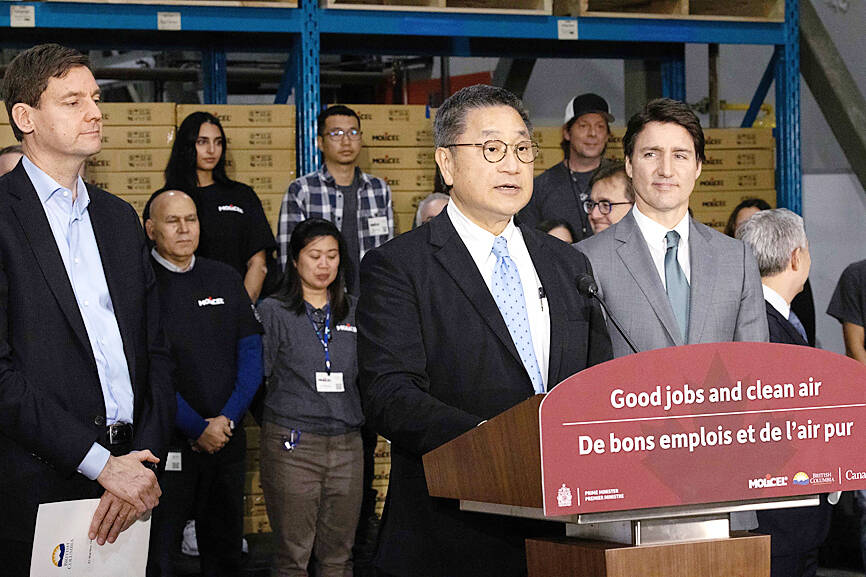Taiwan Cement Corp (TCC, 台灣水泥) yesterday announced that its subsidiary E-One Moli Quantum Energy (Canada) Ltd would establish a battery cell plant in the Vancouver suburb of Maple Ridge, with one-fifth of the funding to be provided by the Canadian government.
E-One Moli plans to start construction of the plant next year, Taiwan Cement said in a statement on its Web site.
The plant, which is to have 2.8 gigawatt-hours of battery capacity, is expected to become fully operational in 2028, producing up to 135 million lithium-ion batteries per year, it said.

Photo courtesy of Taiwan Cement Corp
Taiwan Cement plans an initial investment of NT$25.5 billion (US$794.19 million) in the facility, with a subsidy of NT$4.8 billion from the Canadian government’s Strategic Innovation Fund, the statement said.
TCC Group (台泥集團) is to raise NT$10 billion to finance the investment, with the rest from bank loans and support from strategic investors, the statement said.
The project would be the largest high-performance lithium-ion battery cell investment in Canada, it said.
With British Columbia-based electric utility BC Hydro to build a special transmission and distribution network for E-One Moli to use hydroelectric power in the province, the new plant would become the world’s first battery cell factory that “uses 100 percent green electricity,” it said.
E-One Moli’s announcement came as Canadian Prime Minister Justin Trudeau, accompanied by British Columbia Minister of Jobs, Economic Development and Innovation Brenda Bailey and British Columbia Premier David Eby, visited the subsidiary’s production base in Vancouver on Tuesday.
Trudeau said that British Columbia has long been known for innovation in the clean technology space, and securing the major clean battery project in Maple Ridge would build on that expertise to create jobs and fight climate change.
“When we support projects like E-One Moli’s new facility in Maple Ridge, we bolster Canada’s role as a global clean tech leader, we create good jobs and we help keep our air clean,” the statement quoted Trudeau as saying.
The investment is expected to create 450 jobs, making E-One Moli one of the largest private-sector employers in the region, the firm said.
TCC Group chairman Nelson Chang (張安平) and E-One Moli Energy Corp (能元科技) president Casey Shiue (薛人禎) were at the site to welcome Trudeau and other Canadian officials.
E-One Moli is committed to innovation, creativity and social values, Chang said.
“We believe that carbon dioxide reduction is key to the success of all businesses in the future,” the statement quoted him as saying.

Intel Corp chief executive officer Lip-Bu Tan (陳立武) is expected to meet with Taiwanese suppliers next month in conjunction with the opening of the Computex Taipei trade show, supply chain sources said on Monday. The visit, the first for Tan to Taiwan since assuming his new post last month, would be aimed at enhancing Intel’s ties with suppliers in Taiwan as he attempts to help turn around the struggling US chipmaker, the sources said. Tan is to hold a banquet to celebrate Intel’s 40-year presence in Taiwan before Computex opens on May 20 and invite dozens of Taiwanese suppliers to exchange views

Application-specific integrated circuit designer Faraday Technology Corp (智原) yesterday said that although revenue this quarter would decline 30 percent from last quarter, it retained its full-year forecast of revenue growth of 100 percent. The company attributed the quarterly drop to a slowdown in customers’ production of chips using Faraday’s advanced packaging technology. The company is still confident about its revenue growth this year, given its strong “design-win” — or the projects it won to help customers design their chips, Faraday president Steve Wang (王國雍) told an online earnings conference. “The design-win this year is better than we expected. We believe we will win

Chizuko Kimura has become the first female sushi chef in the world to win a Michelin star, fulfilling a promise she made to her dying husband to continue his legacy. The 54-year-old Japanese chef regained the Michelin star her late husband, Shunei Kimura, won three years ago for their Sushi Shunei restaurant in Paris. For Shunei Kimura, the star was a dream come true. However, the joy was short-lived. He died from cancer just three months later in June 2022. He was 65. The following year, the restaurant in the heart of Montmartre lost its star rating. Chizuko Kimura insisted that the new star is still down

While China’s leaders use their economic and political might to fight US President Donald Trump’s trade war “to the end,” its army of social media soldiers are embarking on a more humorous campaign online. Trump’s tariff blitz has seen Washington and Beijing impose eye-watering duties on imports from the other, fanning a standoff between the economic superpowers that has sparked global recession fears and sent markets into a tailspin. Trump says his policy is a response to years of being “ripped off” by other countries and aims to bring manufacturing to the US, forcing companies to employ US workers. However, China’s online warriors